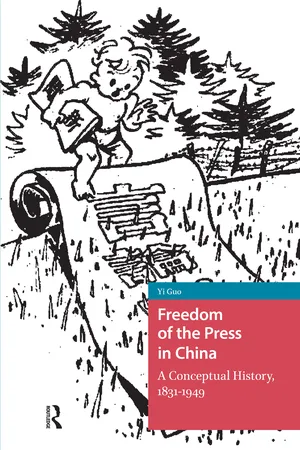
- English
- ePUB (mobile friendly)
- Available on iOS & Android
About this book
Western commentators have often criticized the state of press freedom in China, arguing that individual speech still suffers from arbitrary restrictions and that its mass media remains under an authoritarian mode. Yet the history of press freedom in the Chinese context has received little examination. Unlike conventional historical accounts which narrate the institutional development of censorship and people's resistance to arbitrary repression, Freedom of the Press in China: A Conceptual History, 1831-1949 is the first comprehensive study presenting the intellectual trajectory of press freedom. It sheds light on the transcultural transference and localization of the concept in modern Chinese history, spanning from its initial introduction in 1831 to the establishment of the People's Republic of China in 1949. By examining intellectuals' thoughts, common people's attitudes, and official opinions, along with the social-cultural factors that were involved in negotiating Chinese interpretations and practices in history, this book uncovers the dynamic and changing meanings of press freedom in modern China.
Frequently asked questions
- Essential is ideal for learners and professionals who enjoy exploring a wide range of subjects. Access the Essential Library with 800,000+ trusted titles and best-sellers across business, personal growth, and the humanities. Includes unlimited reading time and Standard Read Aloud voice.
- Complete: Perfect for advanced learners and researchers needing full, unrestricted access. Unlock 1.4M+ books across hundreds of subjects, including academic and specialized titles. The Complete Plan also includes advanced features like Premium Read Aloud and Research Assistant.
Please note we cannot support devices running on iOS 13 and Android 7 or earlier. Learn more about using the app.
Information
Table of contents
- Cover
- Half Title
- Title Page
- Table of Contents
- A Note on Romanization
- Acknowledgements
- Foreword
- Introduction
- 1 The Enlightenment of the West
- 2 Chuban Ziyou: The Invention of a Neologism
- 3 The Liminal Landscape
- 4 The Intellectual Legacy of Sun Yat-se
- 5 The Empty Phrase and Popular Ignorance
- 6 Conceptual Debates in the 1920s and1930s
- 7 The Last Call for Press Freedom
- Conclusion
- Bibliography
- Index